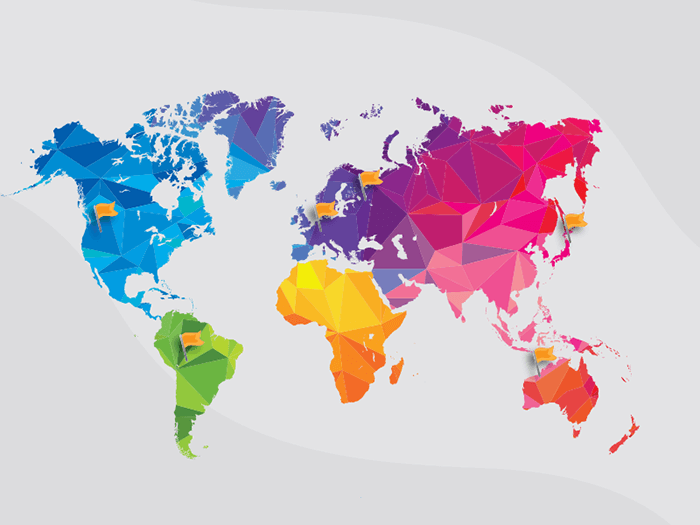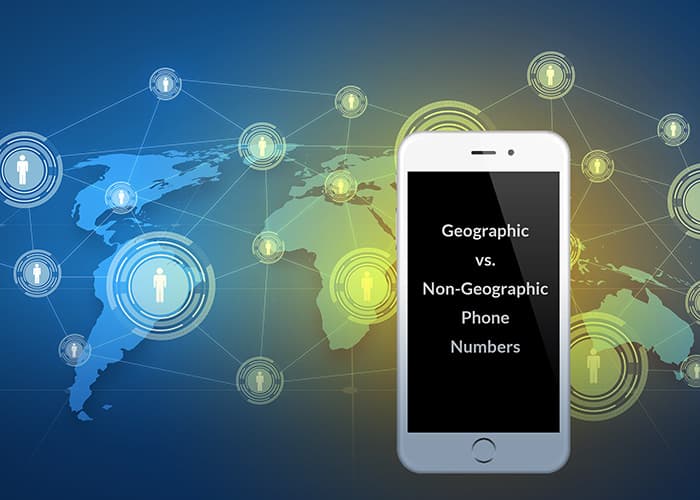The type of business phone number(s) your business uses determines how easy it is for customers to connect and interact with your sales and customer service teams. And there is a wide variety of phone number types to choose from.
Here we compare geographic versus non-geographic numbers, so you have a better idea of what type of number(s) your business needs.
Understanding the Difference Between Geographic and Non-Geographic Numbers
Both geographic and non-geographic numbers are associated with the country they are assigned to. Each country has a variety of geographic and non-geographic phone numbers within its numbering system. These numbers start with specific codes, followed by the subscriber number.
Your business can use these numbers to connect with local customers and vendors within a country, even if your headquarters and teams are located outside the country. A cloud phone service provider like Global Call Forwarding offers cloud-based phone numbers to help companies connect with customers in different countries. And, you can route incoming calls from these numbers to your main office or satellite offices located anywhere globally.
So the question is: Geographic versus non-geographic, which is right for your business?
What are Geographic Numbers?
Geographic phone numbers are local numbers with designated local area codes. These numbers are part of a country’s internal numbering system and are recognizable by locals.
Costs: Calls to these numbers are charged local calling rates. Cost depends on where the call is made from/to.
Coverage: Geographic numbers can receive calls from within and outside the country, making them a suitable regional contact number (i.e., customers in neighboring countries can call these numbers)
Distinction: Geographic phone numbers have specific local area codes for each city or state.
Other names: Local phone numbers
Benefits of geographic numbers:
- Recognizable local area codes
- Local presence
- Regular local calling rates
- Accessible from anywhere within the country and neighboring countries.
What are Non-Geographic Numbers?
Non-geographic phone numbers are tied to the country as a whole instead of specific cities or states. In other words, you can use this one number to answer calls from anywhere in the country. These virtual numbers are also reachable from anywhere in the world.
Costs: Costs shared between the caller and the number subscriber
Coverage: Non-geographic numbers are generally accessible country-wide and reachable from mobile phones and payphones anywhere in the world. These numbers can be dialed from other countries.
Distinction: Non-geographic phone numbers have specific national codes assigned to the country.
Other names: National numbers, shared cost numbers
Benefits of non-geographic numbers:
- Easier documentation requirements
- Excellent in-country coverage from most networks and mobile phones
- National presence
- Shared costs
- Accessible from within and outside the country.

Geographic versus Non-Geographic Numbers
So, what type of business phone number is right for your business?
Both geographic and non-geographic numbers benefit businesses that want a better communication channel with their customers in different parts of the world. You can purchase local or national numbers in bulk and use them for multiple target countries. But what number you need depends on what your business does, who your target audience is, and your international expansion strategies.
1. Comfort of local numbers
Many companies prefer the comfort and convenience of local geographic numbers because they make your business appear as a local one. Customers might think your business is located within the same or neighboring city/state and can offer quick support.
Plus, local numbers cost regular local rates, which are often low. In fact, in some countries, local calls might even be free to call from landlines and mobiles since they count as inclusive minutes in a phone plan.
2. Limitations of a local prefix
One main limitation of a geographic number is that customers may mistake your business for operating only in one area; that is, the area of your area code. Depending on the distance, this may deter some customers from interacting with your business.
3. National presence of national numbers
National prefixes are also recognizable as a local number, establishing a national presence for your business. Customers are less likely to ignore a number they recognize than a prefix they don’t. A non-geographic number works as a central national phone number that does not need to be changed if your business relocates.
4. Easy-to-work-with documentation for non-geographic numbers
One of the main reasons some companies prefer non-geographic numbers over geographic ones is that they cannot provide the required local documentation to activate their number. For every number you purchase, you will need to provide documentation (personal or governmental ID, proof of business address, etc.). Depending on how your business is set up, you may or may not fulfill all the requirements. But national numbers have relatively easier documentation requirements that work better for most companies.
5. Using both number types
One possible solution is to have both geographic and non-geographic numbers and forward all incoming calls to your main office (or wherever you need them). This way, you can have that national presence and make customers in specific regions feel more comfortable using a local number to call your business.
Choosing the Right Type of Business Phone Numbers
To choose the right phone number for your business, you need to first identify your needs. What do you want to achieve with these numbers? What kind of coverage would your particular business benefit from? Our experts at Global Call Forwarding can help you determine the best cloud telephony solutions for your communications needs. Chat with us online or call us at +1 (561) 908-6171!



